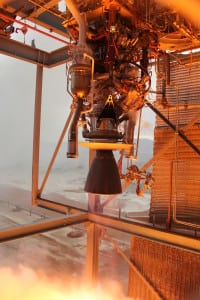Latest News

Blue Origin’s BE-3 engine throttles to its maximum 110,000-lbf thrust during acceptance testing at the company’s dedicated facility in West Texas. Photo: Blue Origin
[Via Satellite 04-07-2015] Blue Origin announced today it has completed acceptance testing of the hydrogen powered BE-3 rocket engine. Built for New Shepard, the company’s vertical takeoff, vertical landing suborbital vehicle, the BE‑3 can be continuously throttled between 110,000-lbf and 20,000-lbf thrust. According to the company, the testing profile included multiple mission duty cycles, deep throttling and off-nominal test points.
In addition to powering New Shepard, the BE-3 engine will later be modified for upper stage applications. Operating as an upper stage engine with hydrogen fuel provides increased payload capabilities, according to Blue Origin Founder Jeff Bezos. The company also plans to use the BE-3 engine in a spaceplane project with Boeing as part of the U.S. Defense Advanced Research Projects Agency’s (DARPA) Experimental Spaceplane 1 (XS-1) program for small satellite launches.
“The BE‑3 has now been fired for more than 30,000 seconds over the course of 450 tests,” said Bezos. “We test, learn, refine and then test again to push our engines. The Blue Origin team did an outstanding job exploring the corners of what the BE‑3 can do and soon we’ll put it to the ultimate test of flight.”
Blue Origin built the BE-3 engine at its design, development and production facility in Kent, Wash., and conducted full-engine testing at its West Texas facilities. The company carried out combustion chamber testing at NASA’s Stennis Space Center in Mississippi. The company’s fourth generation engine, the BE-4 is under development for United Launch Alliance’s (ULA’s) next generation launch system.
Get the latest Via Satellite news!
Subscribe Now